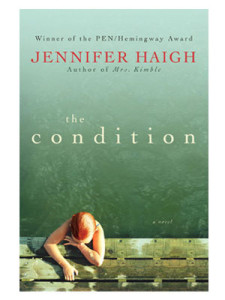 This morning I woke up thinking about my goals as a writer. I quickly made this list:
This morning I woke up thinking about my goals as a writer. I quickly made this list:
Finish writing and revising novel. √
Get an agent. (One is reading revisions now, but hasn’t signed me yet.)
Agent gets (good) book deal.
Book sells well.
So, what’s missing from this list? Possibly the most important goal:
Readers love the book!
It hit me that just because a book sells well that doesn’t guarantee that readers like the book. Here’s how I came to that conclusion.
By my bed I have four books that I purchased and started reading over the past couple of months but didn’t continue. Here are the titles and authors, and the page on which I quit reading each book:
The Snow Queen by Michael Cunningham (page 26)
The Raphael Affair by Iain Pears (page 67)
The Madonnas of Leningrad by Debra Dean (page 94)
Three Story House by Courtney Miller Santo (page 167)
 I decided to look at each book and consider why I quit reading it.
I decided to look at each book and consider why I quit reading it.
First I read this article in the Wall Street Journal, “Guilt Complex: Why Leaving a Book Half-Read Is So Hard.” I was more interested in why people quit reading than why they make themselves continue reading something they’re not interested in. This was interesting:
Leigh Haber, books editor at O, the Oprah Magazine, who suggests candidates to Oprah Winfrey for her consideration for the popular Oprah Book Club, says that while the obvious reasons for abandoning books are distraction and boredom, she attributes much of the behavior to a backlash against writing in which technique trumps storytelling.
Writing workshops teach you to focus on technique, especially if you’re trying to write literary fiction. (Here we go again with the old argument about literary vs. commercial fiction, right?) But a good writing teacher will also tell you that without a great story—and one that keeps you moving forward for the duration of the book—your novel will bore readers. Even readers like me who appreciate a beautifully crafted sentence and a perfectly placed metaphor.
The editor I’m working with on my novel revisions (and the agent who has shown interest) praised my writing techniques, character development and attention to details in the settings. But they said the plot needed work—especially in the middle, where it sagged. So I considered these 4 books I’ve set aside to see why I lost interest. I was expecting to find that it was a sagging plot in each case, but it wasn’t.
The Snow Queen is by one of my favorite authors, Michael Cunningham, who wrote The Hours. I patterned some of the structure for my novel after The Hours and I love Cunningham’s writing. So why did I quit reading after a short 26 pages? The writing is exquisite. The theme—the search for transcendence—is intriguing. But the characters don’t hold my interest. It’s told through the point of view of a young man, and I’m much more drawn to stories that take me into a woman’s mind. What I read about the story line from the inside flap doesn’t wow me, either. But I might come back to this one later, just because I don’t want to give up on Cunningham.
I started reading The Rafael Affair by Iaian Pears because he writes “art mysteries,” and my next novel, which I’ve just started, is about a famous painting. Someone in my writing critique group suggested I read some of Pears’ work to see if I want to lean my novel towards mystery. The book has a similar flavor to Dan Brown’s Da Vinci Code, but again the protag is a man, which might be why I’m not enthralled with it. It’s on the back burner for now….
I can’t remember who recommended Debra Dean’s national bestseller, The Madonnas of Leningrad, but it has all the elements that should hold my interest—female protagonist, art, love, survival. Obviously I wasn’t too bored, since I read 93 pages before stopping, right after a fairly erotic scene, actually. Flipping through the pages leading up to my stopping point, I remember that the timeline was sometimes confusing, and the emotion bordered on melodramatic. There’s still a chance I’ll return to it….
Finally, I bought Three Story House at the author’s reading and signing here in Memphis recently. Courtney Miller Santo’s book strikes me as upmarket commercial fiction. The plot moves along quickly, told through the voices of three young women living in an old house one of them is restoring. And yet 166 pages in, I’m not compelled to continue reading. I think there’s not enough at stake for the protagonist and the two supporting characters. Maybe not enough conflict. I’m not sure I’ll return to this book.
But I’ll try to learn from all of them when the next round of revisions is requested by the agent who is currently reading my novel. I’ll especially try to remember that storytelling trumps technique where most readers are concerned.
 Here’s an interesting post in Publisher’s Weekly’s blog, “Shelf Talker,”—“When Do You Stop Reading a Book?” Scroll down to the comments for some good reflections. One of the comments I found interesting:
Here’s an interesting post in Publisher’s Weekly’s blog, “Shelf Talker,”—“When Do You Stop Reading a Book?” Scroll down to the comments for some good reflections. One of the comments I found interesting:
Years ago I heard a “Rule of 50″ that applies to this question. I do not remember the source. The gist is – the reader should give any book at least 50 pages to determine whether or not to continue. But, for each year over the age of 50, subtract 1 page.
 I’m 63, so following this rule, I should only give a book 37 pages before deciding whether or not to continue reading. Is that because life is too short to read mediocre books or because our attention span declines as we grow older? Either way, I’m moving on to the next book on my bedside table—The Condition (Harper Collins, 2008) by Jennifer Haigh. I started it yesterday and read 47 pages and didn’t want to quit reading, so that’s a good sign. Andre Dubus III (House of Sand and Fog) says it’s “unsentimental, compelling, and moving.” Kirkus Reviews says it’s “filled with genuine insight and touching lyricism.” Sounds like everything I love in a book. The folks at the New York Times thought so when it first came out. I’ll let you know when I finish it.
I’m 63, so following this rule, I should only give a book 37 pages before deciding whether or not to continue reading. Is that because life is too short to read mediocre books or because our attention span declines as we grow older? Either way, I’m moving on to the next book on my bedside table—The Condition (Harper Collins, 2008) by Jennifer Haigh. I started it yesterday and read 47 pages and didn’t want to quit reading, so that’s a good sign. Andre Dubus III (House of Sand and Fog) says it’s “unsentimental, compelling, and moving.” Kirkus Reviews says it’s “filled with genuine insight and touching lyricism.” Sounds like everything I love in a book. The folks at the New York Times thought so when it first came out. I’ll let you know when I finish it.
1 thought on “Writing on Wednesday: The Rule of 50 and Technique vs. Storytelling”
Comments are closed.